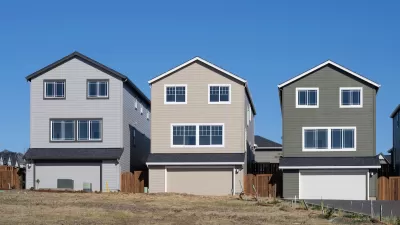From the macro scale to the micro scale, there are many ways in which the housing market playing field is tilted toward financial firms—and many proposals for how to start tilting it back.

What began in earnest during the 2008 financial crisis was exacerbated by COVID-19: large companies, often backed by powerful private equity firms, swept into the single- and multi-family housing market hoping for a big return on their investment. More than a decade later, they’re not only reaping the rewards—they’re increasing their market share.
“They just bought in bulk,” says Oscar Valdés Viera, a research manager at Americans for Financial Reform. “As people were losing their homes, they were taking advantage of that, and they’re doing that again—they’ve expanded during the pandemic.”
According to a report by Americans for Financial Reform, 1.6 million housing units in the U.S. are now owned by private equity, including over 1 million apartment units, 275,000 manufactured home lots, and over 239,000 single-family rental homes.
The report lists 22 private equity-backed companies that hold the 1 million apartment units, which they estimate is 3.6 percent of all apartment units in the country, or about 1 out of every 26 apartment listings. And 12 private equity companies are listed as owners of the manufactured home sites.
“This is just the tip of the iceberg,” says Valdés Viera, a co-author of the report. “There are only four or five private equity companies that are publicly listed that we have access to disclosures [for]. The rest of our findings are based on Facebook data, corporate websites, and some news reports.”
Because of “private equity’s deliberate opacity, these numbers most likely understate private equity ownership,” the report says. “There are a few publicly traded private equity companies—Blackstone, Carlyle, Apollo, KKR—that are subject to SEC rules and regulations including periodic disclosure requirements.”
“By and large the private equity industry thrives by exploiting exemptions and loopholes in securities law and fostered by decades of deregulation in private markets,” the report reads.
Tenants are now less likely than they were before 2008 to have “mom and pop” landlords and are more likely to be dealing with institutional investors, like Blackstone Inc., the Carlyle Group, or KKR as landlords. Along with frequent rent hikes, these tenants often see fees pile up—property administration fee, late fees, various service fees, etc.—and their buildings begin to fall apart.
First-time homebuyers cannot compete. With the supply of housing in the country severely constrained, these companies hold a considerable advantage over low- and middle-income homebuyers, who may only be able to finance through Federal Housing Administration, Department of Veterans Affairs, or U.S. Department of Agriculture mortgages, which take longer to process than a cash offer.
But efforts are underway to level out the playing field, both in terms of acquisitions and operations, from local, state, and federal governments, and even tenants and homeowners themselves.
Making it Easier to Compete
Many of the policy solution discussions on the acquisition side center around trying to reduce the advantage corporate purchasers have by giving other purchasers extra time to come up with the money or assistance in doing so. Finance mechanisms work to get loans and cash into the hands of qualified low- and middle-income buyers, while first look or first right to purchase policies give tenants, nonprofits, or community organizations a window of time when investors are not competing with them.
In California, where the housing market crunch is particularly pronounced, legislation of both types is making its way onto the books.
Two laws specifically address auction sales of distressed properties, or properties that are risk of or have gone through foreclosure. California Senate Bill 1079, which was signed into law in September 2020,
FULL STORY: Hands Off the Houses: Can We Stop Speculative Land Grabs?

Planetizen Federal Action Tracker
A weekly monitor of how Trump’s orders and actions are impacting planners and planning in America.

Maui's Vacation Rental Debate Turns Ugly
Verbal attacks, misinformation campaigns and fistfights plague a high-stakes debate to convert thousands of vacation rentals into long-term housing.

San Francisco Suspends Traffic Calming Amidst Record Deaths
Citing “a challenging fiscal landscape,” the city will cease the program on the heels of 42 traffic deaths, including 24 pedestrians.

Amtrak Rolls Out New Orleans to Alabama “Mardi Gras” Train
The new service will operate morning and evening departures between Mobile and New Orleans.

The Subversive Car-Free Guide to Trump's Great American Road Trip
Car-free ways to access Chicagoland’s best tourist attractions.

San Antonio and Austin are Fusing Into one Massive Megaregion
The region spanning the two central Texas cities is growing fast, posing challenges for local infrastructure and water supplies.
Urban Design for Planners 1: Software Tools
This six-course series explores essential urban design concepts using open source software and equips planners with the tools they need to participate fully in the urban design process.
Planning for Universal Design
Learn the tools for implementing Universal Design in planning regulations.
Heyer Gruel & Associates PA
JM Goldson LLC
Custer County Colorado
City of Camden Redevelopment Agency
City of Astoria
Transportation Research & Education Center (TREC) at Portland State University
Jefferson Parish Government
Camden Redevelopment Agency
City of Claremont





























